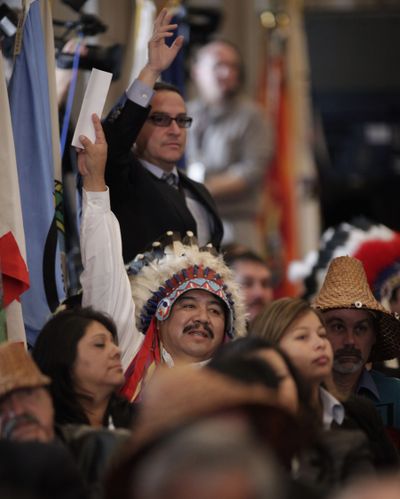Obama holds ‘historic’ conference with tribes
President vows to improve relations on federal issues

WASHINGTON – Representatives from more than 350 American Indian tribes, including those in the Inland Northwest, met Thursday with President Barack Obama, who promised greater coordination on federal issues affecting them.
“You will not be forgotten as long as I’m in this White House,” Obama said.
After answering questions from the audience, Obama signed a memorandum giving Cabinet agencies 90 days to submit plans to improve consultation between the federal government and the tribes.
In a town hall-style event moderated by Interior Secretary Ken Salazar, tribal representatives asked about government actions on problems affecting tribal lands. Numerous federal department heads talked with the group about government efforts, including Energy Secretary Steven Chu, Agriculture Secretary Tom Vilsack, EPA Administrator Lisa Jackson and Education Secretary Arne Duncan.
“I’m confident there’s never been a gathering like this,” Salazar said.
The conference followed the grand opening of the National Congress of American Indians U.S. embassy Tuesday. Representatives from the Confederated Tribes of the Colville Reservation, the Spokane Tribe, the Coeur d’Alene Tribe and the Kalispel Tribe of Indians attended.
Greg Abrahamson, chairman of the Spokane Tribal Business Council, said he was able to deliver position papers directly to Cabinet representatives, and he hopes the departments will use them in conversations with the Spokane Tribe.
The signs are good so far, he said. The administration has shown its commitment by raising Indian Health Service’s reimbursement rates and engaging tribes on a nation-to-nation basis.
“(Obama’s) starting out on the right track,” Abrahamson said.
Nick Pierre, a member of the Kalispel Tribal Business Council who attended, said he’s interested to see how the administration keeps its pledge to come up with new engagement plans within the next three months. But he never imagined he’d be in the same room as the president, he said, and he believes the government will continue its renewed engagement effort.
“Today was a historic event,” Pierre said. “Not too many times have presidents acknowledged the nation-to-nation relationship with tribal nations.”
Michael Finley, chairman of the Colville Tribal Business Council, said Thursday’s event was unprecedented. Many of the issues most important to Indian Country, such as health care, law enforcement and education, were addressed, he said. But he would have liked to see more discussion about land trust reform.
“It was the 800-pound gorilla in the room,” Finley said. “I was amazed it didn’t get more attention than it did.”
But overall, the conference signaled a positive shift in the government’s relationship with Indian Country, Finley said. Case in point: He got to shake Obama’s hand.